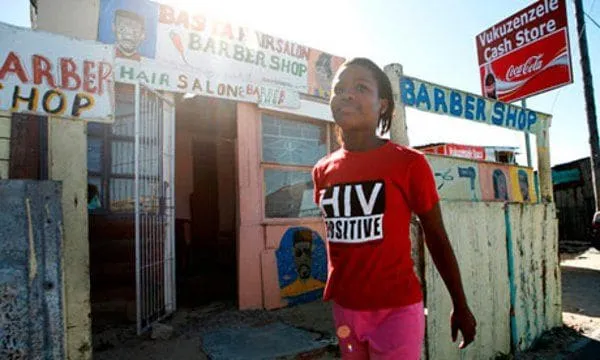Eye For Film >> Movies >> Fire In The Blood (2012) Film Review

The title of Fire In The Blood is a clever one. Certainly it refers to the film's central theme - HIV/AIDS and its devastating impact on Africa and the rest of the developing world - but it also references the ceaseless campaigning of a small but dedicated number of people who were fired up to try to stop the scandal of a disease that was needlessly killing millions. Lastly, it could well be taken to refer to the reaction of audiences, whose blood is likely to be boiling as a result of the criminal level of injustice documented by Dylan Mohan Gray's forthright and shocking film.
You might think that you have a decent grounding in the AIDS epidemic, your knowledge broadened by documentaries such as We Were Here and How To Survive A Plague. But what about on the continent of Africa? The key fact you're likely to know is that it was devastating and cost the lives of millions. You might also think that was largely due to the high price of anti-retoviral (ARV) treatment - but what if that was not really the case?

What you are unlikely to be aware of is the way that the pharmaceutical industry and the West - from governments to the UN and World Trade Organisation - conspired in a way that let millions on the continent die unnecessarily from the condition, even as those in developed nations were benefiting from ARV drugs. Perhaps most shockingly of all, the 'conspiracy' was not a cloak and dagger enterprise but an almost casual result of people putting ideology - laced with latent racism - before humanity.
Early in the documentary, Doctor Peter Mugyenyi says: "There is no developed country that would have tolerated the loss of millions of their citizens while life-saving drugs were available." And yet, this is exactly what happened in Africa.
Gray transports us into the history of the issue through the testimony of those who were fighting for the lives of their fellow citizens - Mugyenyi, watching people die daily at his HIV treatment centre in Uganda; Zachie Achmat, a South African HIV-sufferer-turned-activist, who refused treatment until it was available to all; and Yusuf Hamied, an Indian "iconoclast" whose drug firm Cipla seems to have a unique pharmaceutical credo of putting people before profit.
Showing a remarkably firm hand for a first-time director, Gray skilfully guides us through a sea of statistics concerning those dying from the disease and archive footage and recollections of the time, while simultaneously building a cast-iron case against Big Pharma who are still using Patent law as a stick with which to beat the developing world. Gray asserts that the companies' unwillingness to give cheap non-branded versions of the ARVs to Africa stems not from the need to safeguard profits (just one per cent of drug company profits come from Africa) but from a pure and simple fear that, if the genie gets out of the bottle, people in the West might start asking uncomfortable questions about the price of their pills.
He also shows that, despite Hamied's willingness to manufacture the necessary drugs for a fraction of the cost of the branded medicines, he and others had to fight on for years before the West and the governments of developing countries that were watching their own people die, relented.
Gray is single-minded in his approach, smartly avoiding any number of political offshoots from the central issue - such as South African President Thabo Mbeki's AIDS denial - to keep the stories of the campaigners, victims and the survivors at the heart of his film. His argument is clear, well-defined and compelling, drawing connections to the Ghandian philosophy of self-reliance and peaceful resistance that leave you a lot to think about.
While the problems of patents have been raised before in Sicko, with reference to the pharmaceuticals' stranglehold in the rich West, here Gray gives you more of a sense of their malevolance when it comes to the poor on our doorsteps and the rest of the world, leaving you with one urgent, abiding thought - do we really want companies who provide lifesaving medicines to put profit before people?
Reviewed on: 20 Feb 2013

















